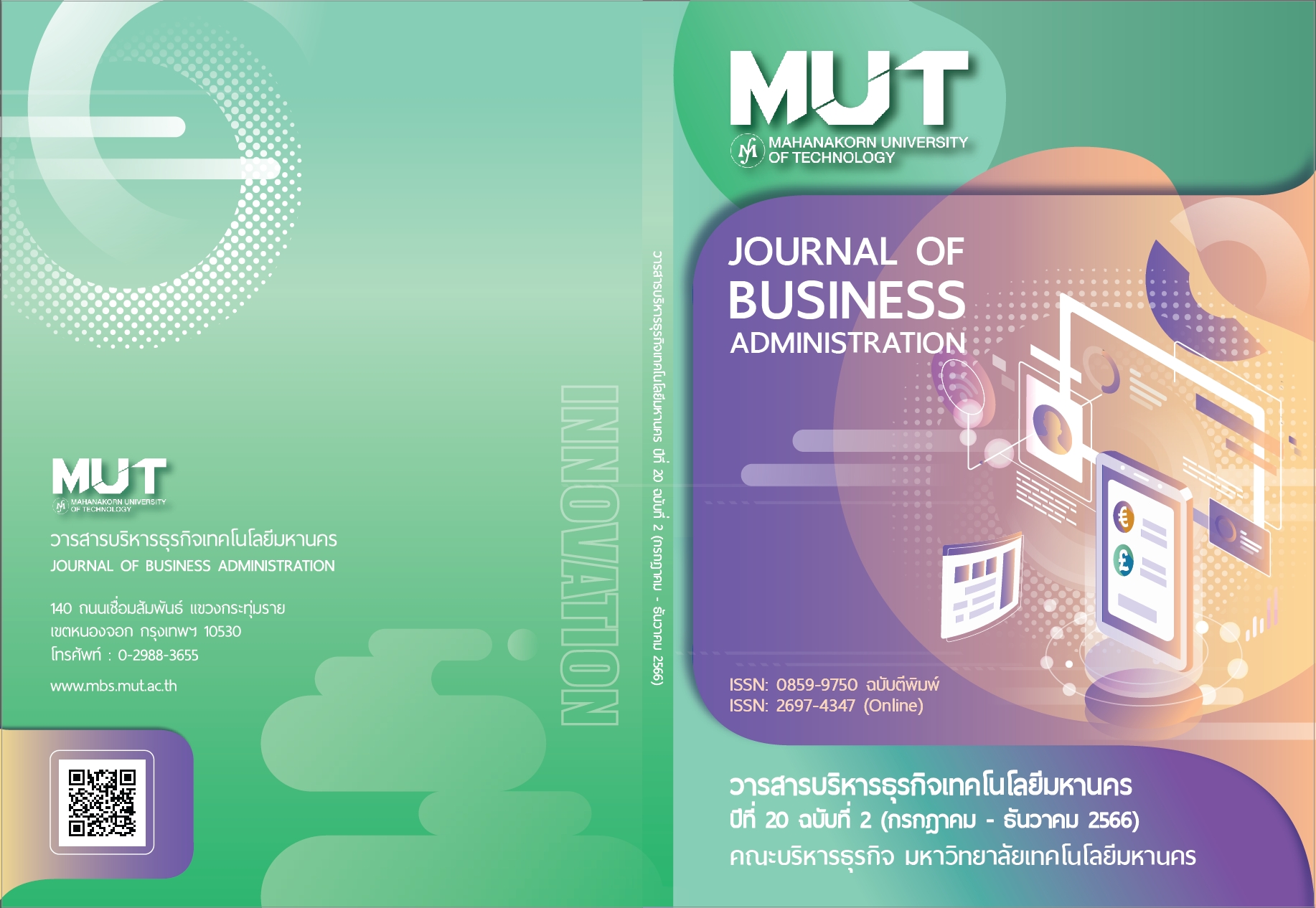Factors Influencing Intention to Use the Inter-City Route Ticketing System (Bor Kor Sor Card) of Transport Co., Ltd.: An Integration of Technology Acceptance Model and Innovation Diffusion Perspective
Keywords:
Technology acceptance model, Inter-City Bus E-Ticketing, Intelligent transportation system, Intention to Use TechnologyAbstract
The purpose of this research article is to investigate the factors influencing the intention to use the intercity bus card system (Bor Kor Sor Card) by passengers traveling on intercity bus routes in Thailand. This study utilized a survey conducted with service users of intercity bus routes in four main areas: Bangkok Bus Terminal, Northern Bus Terminal, Eastern Northeastern Bus Terminal, and Southern Bus Terminal, with a total of 616 responses. The survey questionnaire was developed based on a research framework within the context of technology acceptance and innovation diffusion theory. A literature review related to the use of smart card systems in both the direct and indirect transport sectors was conducted to gain a better understanding of passenger behavior in the current era.
Statistical analysis through multiple stepwise regression revealed that the technology of booking and paying for bus fares through mobile application platforms, in the form of the BKS Card, significantly influenced social factors, environmental factors that support technology usage, and perceived financial risk factors. These factors, in contrast, did not significantly impact the intention to use technology. However, factors related to attitudes toward technology experimentation, observed outcomes, perceived benefits, and perceived ease of use had a considerable influence on passengers' intention to accept and promote the dissemination of this technology system.
References
Ajzen, I. 1991. The theory of planned behavior. Organizational Behavior and Human Decision Processes. Vol. 50. (2). 179 - 211. Retrieved on April 10, 2023 from doi:https://doi.org/10.1016/0749-5978(91)90020-T
Ajzen, I. and Fishbein, M. 1980. Understanding attitudes and predicting social behavior. In E. Cliffs (Ed.). NJ: Prentice-Hall.
Beatson, A. et al. 2007. Self-Service Technology and the Service Encounter. The Service Industries Journal. Vol. 27. (1). 75 - 89. Retrieved on April 16, 2023 from doi:10.1080/02642060601038700
Billanes, J. and Enevoldsen, P. 2021. A critical analysis of ten influential factors to energy technology acceptance and adoption. Energy Reports. Vol. 7. 6899 - 6907. Retrieved on May 2, 2023 from doi:https://doi.org/10.1016/j.egyr.2021.09.118
Chen, C.-C. et al. 2022. Exploring the factors of using mobile ticketing applications: Perspectives from innovation resistance theory. Journal of Retailing and Consumer Services. Vol. 67. 102974. Retrieved on April 4, 2023 from doi:https://doi.org/10.1016/j.jretconser.2022.102974
Cheong, S.-N. et al. 2014. Secure Encrypted Steganography Graphical Password scheme for Near Field Communication smartphone access control system. Expert Systems with Applications. Vol. 41. (7). 3561 - 3568. Retrieved on March 30, 2023 from doi:https://doi.org/10.1016/j.eswa.2013.10.060
Chunhachan, N. 2020. Strategic Plan For Digital Payment In Bangkok Metro System. Master of Management Thematic Paper. Mahidol University.
Cserdi, Z. and Kenesei, Z. 2021. Attitudes to forced adoption of new technologies in public transportation services. Research in Transportation Business and Management. Vol. 41. 100611. Retrieved on March 10, 2023 from doi:https://doi.org/10.1016/j.rtbm.2020.100611
Davis, F. D. 1989. Perceived Usefulness, Perceived Ease of Use, and User Acceptance of Information Technology. MIS Quarterly. Vol. 13. (3). 319 - 340. Retrieved on April 20, 2023 from doi:10.2307/249008
Davis, F. D. et al. 1992. Extrinsic and Intrinsic Motivation to Use Computers in the Workplace1. Journal of Applied Social Psychology. Vol. 22. (14). 1111 - 1132. Retrieved on March 13, 2023 from doi:https://doi.org/10.1111/j.1559-1816.1992.tb00945.x
Deveci, M. et al. 2019. Evaluation of service quality in public bus transportation using interval-valued intuitionistic fuzzy QFD methodology. Research in Transportation Business and Management. Vol. 33. 100387. Retrieved on April 2, 2023 from doi:https://doi.org/10.1016/j.rtbm.2019.100387
Eboli, L. and Mazzulla, G. 2007. Service Quality Attributes Affecting Customer Satisfaction for Bus Transit. Journal of Public Transportation. Vol. 10. Retrieved on April 23, 20233 from doi:10.5038/2375-0901.10.3.2
European Parliament. 2015. Science and Technology Options Assessment 2014.
Irawan, M. Z. et al. 2022. Using an integrated model of TPB and TAM to analyze the pandemic impacts on the intention to use bicycles in the post-COVID-19 period.
IATSS Research. Vol. 46. (3). 380 - 387. Retrieved on April 10, 2023 from doi:https://doi.org/10.1016/j.iatssr.2022.05.001
Liébana-Cabanillas, F. et al. 2014. The moderating effect of experience in the adoption of mobile payment tools in Virtual Social Networks: The m-Payment Acceptance Model in Virtual Social Networks (MPAM-VSN). International Journal of Information Management. Vol. 34. (2). 151-166. Retrieved on March 3, 2023 from doi:https://doi.org/10.1016/j.ijinfomgt.2013.12.006
Lok, C. K. 2015. Adoption of Smart Card-Based E-Payment System for Retailing in Hong Kong Using an Extended Technology Acceptance Model. E-services Adoption: Processes by Firms in Developing Nations. Vol. 23B. 255 – 466. Emerald Group Publishing Limited.
Makarapong, D. and Punnakitikashem, P. 2018. Behavior Intention of E-Ticket System of Public Transportation System Users. KMUTT Research and Development Journal. Vol. 41. (1). 115 - 126.
Marfo, P. and Quansah, E. 2020. Factors Influencing the Adoption of E-Ticketing System in the Bus Transport Sector in Ghana. Journal of Software Engineering and Applications. Vol. 13. 161 - 178. Retrieved on March 30, 2023 from doi:10.4236/jsea.2020.138011
Moore, G. C. And Benbasat, I. 1991. Development of an Instrument to Measure the Perceptions of Adopting an Information Technology Innovation. Information Systems Research. Vol. 2. (3). 192 - 222. Retrieved on April 6, 2023 from doi:10.1287/isre.2.3.192
Njoku, I. and Adetunji, A. A. 2021. Analysis of User Acceptance of the E-Ticketing System in Lagos. International Journal of Scientific Research in Computer Science and Engineering. Vol. 9. (5). 61 - 68.
Nunnally, J. C. 1978. An Overview of Psychological Measurement. In B. B. Wolman (Ed.). Clinical Diagnosis of Mental Disorders: A Handbook. 97 - 146. Boston. MA: Springer US.
Ooi, K.-B. and Tan, G. W.-H. 2016. Mobile technology acceptance model: An investigation using mobile users to explore smartphone credit card. Expert Systems with Applications. Vol. 59. 33 - 46. Retrieved on March 14, 2023 from doi:https://doi.org/10.1016/j.eswa.2016.04.015
Qteishat, M. et al. 2014. The impact of e-ticketing technique on customer satisfaction: an empirical analysis. Journal of Information Systems and Technology Management. Vol. 11. 519 - 532. Retrieved on April 10, 2023 from doi:10.4301/S1807-17752014000300001
Rattanamanee, N. 2020. The Business Managament Of Smart Mobility Mass Transportation On Private Sector In Bangkok And Metropolitan Areas. Doctor of Philosophy Thesis (Management). Silpakorn University.
Rogers, E. M. 2003. Diffusion of Innovations (5th edition ed.). New York: Free Press.
Roy Dholakia, R. and Uusitalo, O. 2002. Switching to electronic stores: consumer characteristics and the perception of shopping benefits. International Journal of Retail and Distribution Management. Vol. 30. (10). 459 - 469. Retrieved on April 25, 2023 from doi:10.1108/09590550210445335
Sharifzadeh, M. S. et al. 2017. RETRACTED: Perceived usefulness of personal protective equipment in pesticide use predicts farmers' willingness to use it. Science of The Total Environment. Vol. 609. 517 - 523. Retrieved on April 4, 2023 from doi:https://doi.org/10.1016/j.scitotenv.2017.07.125
Soegoto, E. S. et al. 2020. Impact of E-Ticketing Application on Bus Transportation in Bandung. Paper presented at the Proceedings of the International Conference on Business, Economic, Social Science, and Humanities – Economics, Business and Management Track (ICOBEST-EBM 2019).
Upendra Reddy, C. et al. 2019. Bus Ticket System for Public Transport Using QR Code. IOP Conference Series: Materials Science and Engineering. Vol. 590. (1). 012036. Retrieved on May 1, 2023 from doi:10.1088/1757-899X/590/1/012036
Venkatesh, V. and Davis, F. D. 2000. A Theoretical Extension of the Technology Acceptance Model: Four Longitudinal Field Studies. Management Science. Vol. 46. (2). 186 - 204. Retrieved on March 12, 2023 from doi:10.1287/mnsc.46.2.186.11926
Wolken, A. R. et al. 2018. Driving change: technology diffusion in the transport sector. New Zealand: NZ Transport Agency.
Yuen, K. F. et al. 2020. The determinants of public acceptance of autonomous vehicles: An innovation diffusion perspective. Journal of Cleaner Production. Vol. 270. 121904. Retrieved on April 22, 2023 from doi:https://doi.org/10.1016/j.jclepro.2020.121904
Downloads
Published
Issue
Section
License

This work is licensed under a Creative Commons Attribution-NonCommercial-NoDerivatives 4.0 International License.
ข้อความ ข้อคิดเห็น ข้อมูล เนื้อหา รูปภาพ แผนภูมิ แผนผัง เป็นต้น ที่ปรากฏและแสดงในบทความต่างๆ ในวารสารบริหารธุรกิจเทคโนโลยีมหานคร ถือเป็นความรับผิดชอบโดยตรงของผู้เขียนบทความนั้นๆ มิใช่เป็นความรับผิดชอบใดๆ ของวารสารบริหารธุรกิจเทคโนโลยีมหานคร และมหาวิทยาลัยเทคโนโลยีมหานคร
บทความที่ตีพิมพ์ในวารสารบริหารธุรกิจเทคโนโลยีมหานคร ถือเป็นลิขสิทธิ์เฉพาะของคณะบริหารธุรกิจ มหาวิทยาลัยเทคโนโลยีมหานคร หากบุคคลหรือหน่วยงานใดต้องการนำทั้งหมดหรือส่วนใดส่วนหนึ่งไปเผยแพร่ต่อหรือเพื่อกระทำการใดๆ จะต้องได้รับการอนุญาตเป็นลายลักษณ์อักษรจากคณะบริหารธุรกิจ มหาวิทยาลัยเทคโนโลยีมหานครก่อนเท่านั้น


